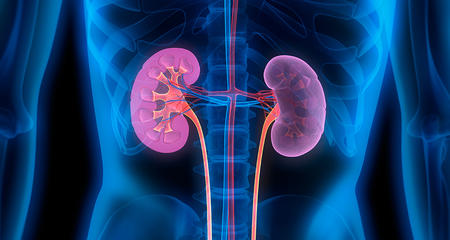The pituitary gland — located at the base of the brain — is considered the “master” gland of the body because it secretes multiple hormones that control other glands and functions in the body. Our growth, metabolism, energy, blood pressure and many other functions are regulated by the pituitary gland. It works with the other glands in the body as part of our endocrine system. Because the pituitary gland is located close to the brain, disorders may also affect the nervous system.
The Pituitary Disorders Program offers comprehensive and convenient evaluation and treatment of patients with tumors and other disorders of the pituitary gland and surrounding areas of the brain. The program is part of the Froedtert & MCW Neuroscience Center, offering a full range of the most advanced, evidence-based treatment options.
High-Caliber Pituitary Disorders Care
The Pituitary Disorders Program team includes endocrinologists, neurosurgeons and otolaryngologists (ear, nose and throat) with expertise in pituitary disease. Physicians who specialize in radiation oncology, neuro-ophthalmology, and neuro-interventional radiology are also part of the multidisciplinary Pituitary Disorders Program team.
Because many vision problems may occur as the result of pituitary tumors, neuro-ophthalmologists (physicians who specialize in treating visual problems related to the nervous system) are also part of the care team.
- State-of-the art diagnostic procedures for accurately determining each patient’s condition and needs
- Patient and family education
- A full menu of pituitary treatment options, including innovative surgical approaches
- Second opinion evaluations
- A national reputation for pituitary research
Our large volume of surgery experience helps drive better patient outcomes than smaller programs achieve.
Symptoms of Pituitary Disorders
The pituitary gland produces hormones that affect many other glands in the body.
- Prolactin, to stimulate milk production after childbirth
- Growth hormone, to stimulate childhood growth and maintain a healthy body composition in adults
- Adrenocorticotropin (ACTH), to stimulate the production of cortisol, an important stress hormone that helps maintain blood pressure and other vital functions in the body
- Thyroid-stimulating hormone (TSH), to regulate the body’s metabolism and energy
- Luteinizing hormone (LH) and follicle-stimulating hormone (FSH), to regulate testicular function in men and ovarian function in women
The cause of pituitary disorders is largely unknown. Radiation treatment of the brain (for other disorders) has been shown to contribute to low pituitary function. Other causes include pituitary tumors, trauma, Rathke’s cleft cyst (a non-cancerous growth on the pituitary), and Sheehan’s syndrome and lymphocytic hypophysitis, both rare conditions often related to pregnancy.
Pressure from a tumor in the gland may result in headache and vision problems. Too much or too little of certain hormones may also cause the following symptoms.
- Muscle weakness
- Fatigue
- Less frequent or no menstrual periods
- Body hair loss
- Sexual dysfunction and infertility
- Increased frequency and amount of urination
- Excessive thirst
- Unintended weight loss or gain
- Development of a hump on the upper back
- High or low blood pressure and high or low blood sugar
- Bruising and thinning of the skin
- Anxiety, irritability or depression
- Exaggerated facial features and enlarged hands and feet
- Excess sweating
- Heart problems
- Joint pain
- Cold intolerance
- Constipation or diarrhea
Pituitary Tumors
Most diseases of the pituitary gland involve benign (non-cancerous) tumors in the area of the pituitary. Tumors can make the pituitary gland produce too much or too little of a hormone, causing problems throughout the body. Our physicians are highly experienced in treating a wide variety of pituitary disorders.
Pituitary tumors or masses (adenomas) may include:
- Acromegaly – an excess in growth hormone production
- Prolactinoma – an excess in the hormone prolactin, which stimulates milk production after childbirth
- Cushing’s disease – an excess in the stress hormone, cortisol, caused by a tumor that secretes adrenocorticotropin (ACTH)
- Thyrotropin-secreting pituitary tumors – an excess in thyroid-stimulating hormone (TSH)
- Gonadotrophic tumors – masses that may secrete FSH and/or LH that regulate estrogen levels in women and testosterone levels in men
- Non-secretory pituitary tumors – tumors that do not secrete a pituitary hormone in excess but may cause health issues due to their size or location
- Non-pituitary tumors of the sellar region – tumors such as craniopharyngioma, metastatic tumors to the pituitary area, and other tumors that can develop in the region surrounding the pituitary gland
Hypothalamic-Pituitary Disorders
The pituitary gland is regulated by a region of the brain called the hypothalamus, which secretes the neurohormones that stimulate or suppress the release of pituitary hormones. Some conditions are not caused by tumors, but by some other dysfunction of the hypothalamus and pituitary. These conditions may include:
- Anterior pituitary failure (hypopituitarism, panhypopituitarism) – when the front (anterior) of the pituitary fails to produce any or adequate amounts of one or more hormones, hypopituitarism results. Panhypopituitarism occurs when all hormones are lost.
- Hyperprolactinemia – when the pituitary secretes excessive amounts of prolactin, sometimes a side-effect when taking certain medications.
- Diabetes insipidus – when the body produces excessive quantities of urine, the result of the pituitary gland’s inadequate production of antidiuretic hormone (ADH) or vasopressin.
- Empty sella syndrome – occurs when the area surrounding the pituitary gland fills with cerebrospinal fluid, causing the pituitary gland to be smaller than normal, flattened or absent.
- Neurosarcoid – results from involvement in the brain, spinal cord, and other areas of the nervous system with sarcoidosis
Blogs, Patient Stories, Videos and Classes





